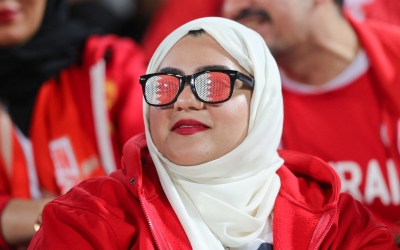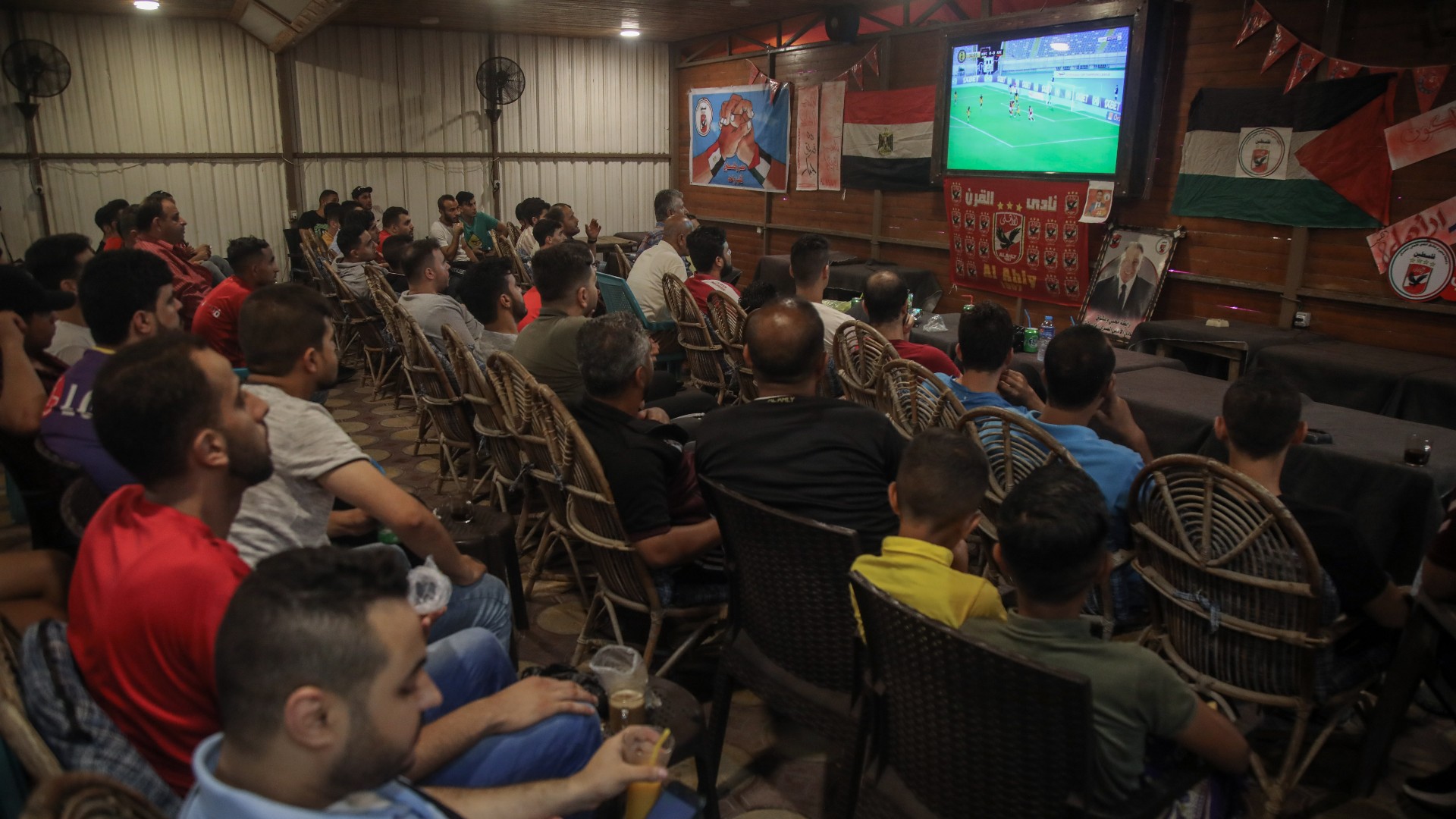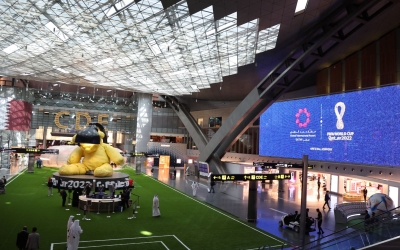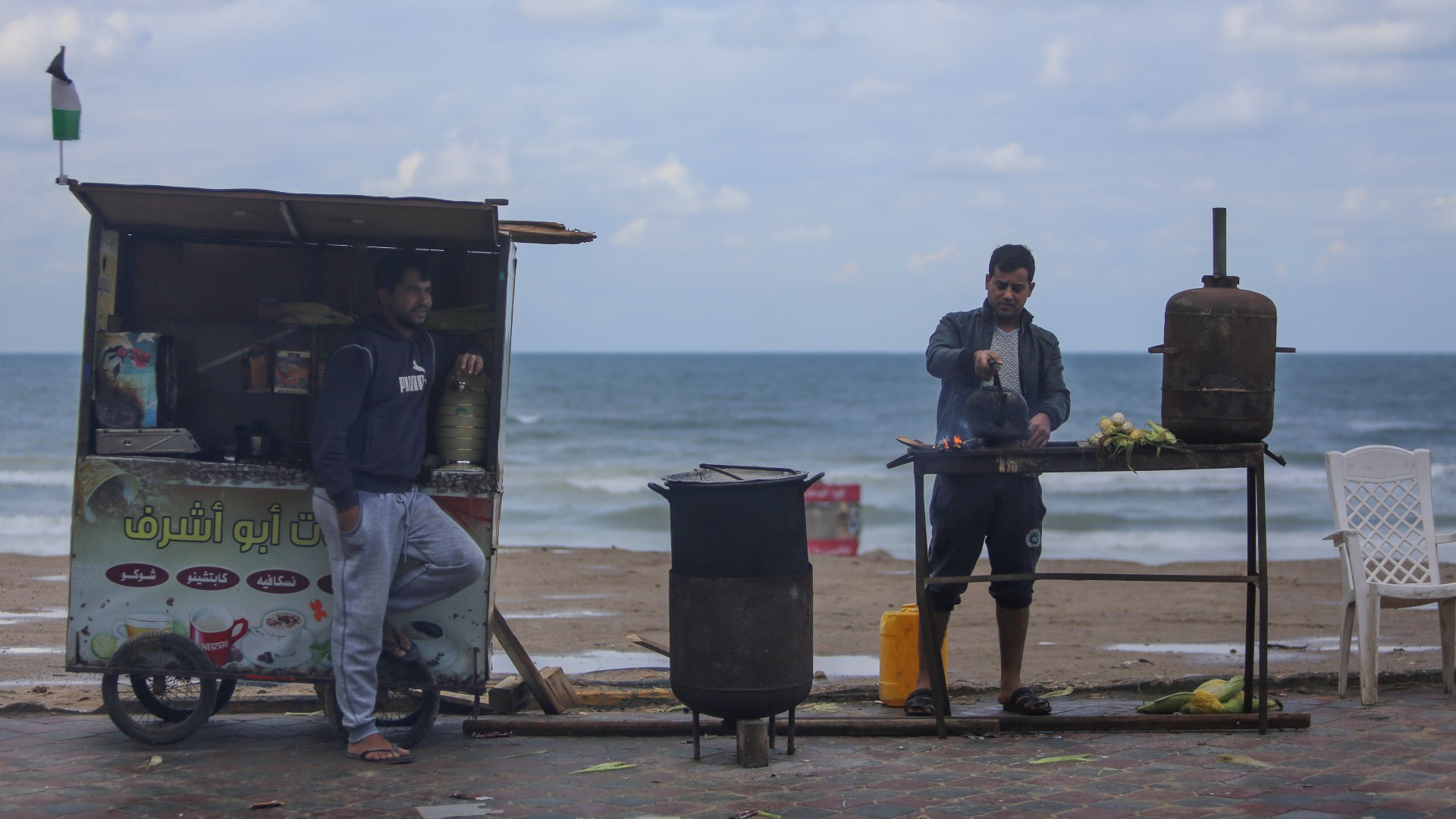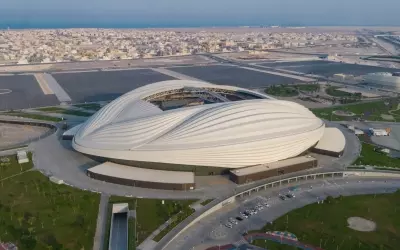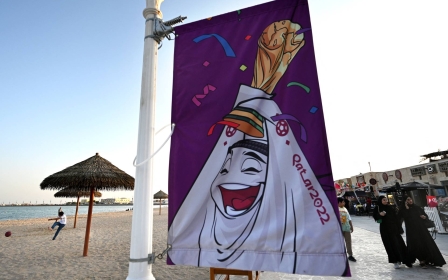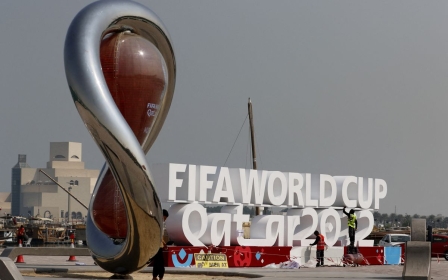Qatar World Cup: For Palestinians in Gaza the tournament is a luxury most cannot afford
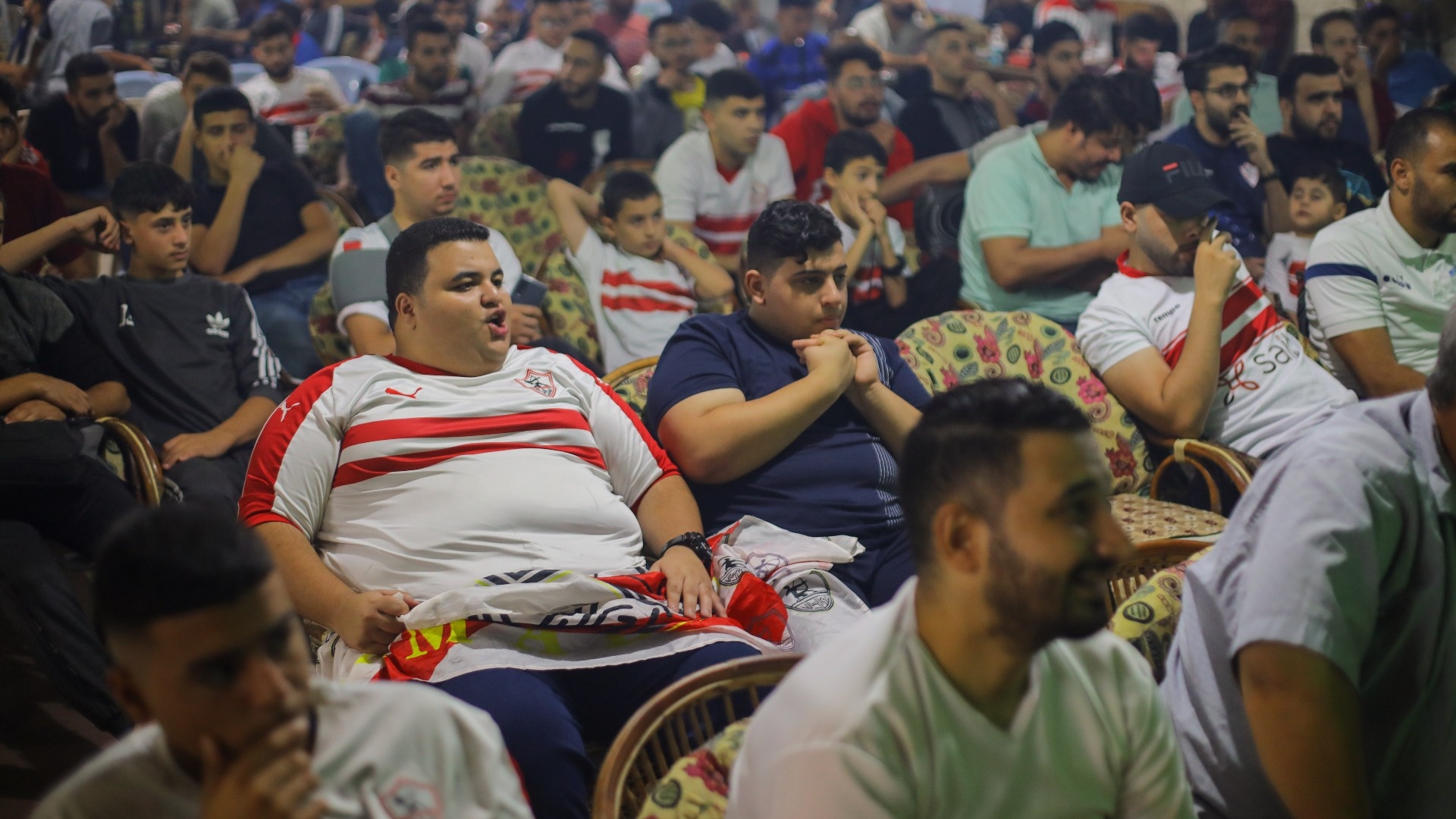
Palestinian footballer Muhammed Salman wants to play the beautiful game.
The 27-year-old has spent the better part of four years trying to renew his Israeli permit so he can head from Gaza to the occupied West Bank and play the sport he loves.
But Israel's debilitating blockade on the Gaza Strip has halted his pitch time far worse than any metatarsal injury could.
In 2018, the agile midfielder was granted a permit by Israeli authorities to enter the northern West Bank and play for the Tubas Sport Club.
'Every football player would want to attend the World Cup… but it remains merely a wish as long as we are in Gaza'
- Muhammed Salman, Gazan footballer
But just three months later his permit expired, forcing him to return home.
Like nearly all footballers in Gaza, Salman told Middle East Eye that he was eagerly counting down the hours to the Qatar World Cup and wanted to attend the first Middle East tournament in person.
"Every football player would want to attend the World Cup. It is something inside us to want to be there, to watch the players closely and imagine the day we would be in their place, but it remains merely a wish as long as we are in Gaza," Salman said.
"It is hard to imagine that you would make any dream come true in Gaza. I cannot attend a World Cup game, how would I ever be able to compete in the national team and reach the world?"
Movement restrictions
The Qatar World Cup kicks off on 20 November and is a hugely anticipated event for most Arabs in the region, including those in Gaza.
But Israel's restrictions on travel have cast a shadow over the tournament. Gaza has been under a debilitating Israeli land, naval, and air blockade since 2006, after Hamas won the Palestinian legislative elections.
In 2007, Israel tightened the blockade after Hamas took control of the Strip, and began restricting the movement of people and goods in and out of the territory in what it calls a "separation policy" that aims to avoid transferring "a human terrorist network".
While the Strip is only around two hours away from Tubas where Salman's football club is based, it's been over four years since Salman crossed the Erez border - the only land crossing for Palestinians who want to move between Gaza and the rest of the occupied Palestinian territory.
To pass through Erez in order to enter the occupied West Bank or Israel on their way to a third country, Gaza residents need an exit permit from the Israeli authorities, which they only grant to people who fall within very limited categories - including critical medical and humanitarian cases, staff of international organisations, or students with scholarships to study abroad.
By default, those who wish to travel to Qatar to attend the World Cup can't think of the Erez crossing as an option out of the occupied Palestinian territories.
"This is the first time an Arab country hosts the World Cup. I think that all Arabs wish to attend the tournament, but being an Arab and being a Gazan are two different things when it comes to traveling." Salman added.
While the Rafah border crossing with Egypt remains the main exit point for individuals who wish to travel to Egypt or other countries, the uncertainty about its temporary closures has led many Gaza residents fearful over their jobs should the border close.
Ahmed Bassel, a 27-year-old resident of the southern Gaza City, could not join his wife and her family who travelled last week to Qatar to attend the World Cup.
"I am capable financially to join them, but who knows what would happen in the next few weeks until the World Cup is over? My wife does not work but I have a job and I cannot risk it if the border closed and I got stuck outside of Gaza, said Bassel, who works in a civil society organisation.
"I really wish I could go, especially that we are newly married and we have just had our first son. We would have made great memories," he added.
Although the Rafah crossing has been open in recent months, the majority of Gaza residents still have doubts that it might close at any moment depending on the uncertain political situation, and based on their previous experience.
The UN reports that the crossing has been closed for at least 102 days this year, with 2021 seeing 144 closures and 240 in 2020.
"I will watch the tournament on TV, but I hope I would be able to attend the next World Cup in person."
A costly prospect
Bassel said the increasing number of young unemployed people among highly skilled Palestinians is one of the reasons he does not feel secure in his job.
"If I travelled and got stuck outside of Gaza, it is likely that another person would be hired for my job," he said.
But Bassel thinks that even if the travel restrictions were eased, the vast majority of the Strip's two million residents would still be unable to attend the matches.
"Travelling to attend the World Cup is a luxury Gazans cannot afford; many people are unable to afford travelling for more crucial purposes like medical treatment and education."
For a Gaza resident, the average cost of attending only one match in Qatar - considering the minimum travel and hotel expenses for one day - would be at least $1,400, equivalent to 140 days of work for a Gaza resident whose average daily wage is $10.
As of June, nearly 80 percent of Gaza residents were dependent on international humanitarian aid, and 80 percent of youth were unemployed, according to the United Nations. The poverty rate hit 64 percent, with an increase of at least 19 percent since the imposition of the blockade.
According to Salman, a football player in the West Bank receives around $12,000 as an annual base salary from his club. But in Gaza, the situation is "a bit complicated", which is why he became a taxi driver.
"I am still training with my club in Gaza and I am planning to continue my career in football, but I also need an income," he said.
Abd al-Salam Hania, the assistant secretary general of the Higher Council for Youth and Sports in Gaza (HCYS), told MEE that a very limited number of Gaza residents will be attending the Qatar World Cup.
"There are some people who have indeed applied for the Hayya card [a document given to fans attending the World Cup] and started travelling to Qatar, but this is a limited category who can afford the journey," he said.
"Most Gazans will not be able to apply for it due to the harsh economic conditions and the fact that it is not easy for Palestinians in the Strip to enter and exit Gaza.
"People do not seek attending the World Cup in person because the problem is not just about getting a visa, but also about the air fare and hotel accommodation as well as other expenses. Not everyone can afford paying $3,000 to spend a few days in Doha."
Hania added that around 40 Palestinians from Gaza have been selected by Qatar’s Supreme Committee for Delivery and Legacy (SC) among 20,000 volunteers worldwide who will take part in the coordination process and provide the necessary assistance to fans during the event.
Coffee shop community
Due to frequent power cuts and lack of electricity, fans usually head to coffee shops that have power generators to watch football matches.
During the Qatar World Cup, coffee shops in Gaza are expected to be crowded with hundreds of fans who can neither attend the tournament in person nor watch it at home due to power shortages.
Hani Afana, who works in a telecommunications company, says that since he could not go to Qatar to attend the matches, he will watch them mainly in coffee shops.
"There are some matches that I usually watch at home, but others, especially the important ones, I prefer to watch them in coffee shops with my friends," the 28-year-old told MEE.
"It gets interesting if my friends and I are fans of different football teams, it becomes kind of a competition."
Afana, who is preparing for his wedding in the next few months, says that the difficult economic situation in the Strip is one reason his relatives and friends are not considering attending the tournament in person.
"Very few will be able to afford the costly trip to attend the World Cup. But there are always alternatives," he added.
For this reason, HCYS, with the support of the Qatar Committee for the Reconstruction of Gaza, has prepared a sport stadium that accommodates hundreds of fans who will not be able to attend the tournament in Qatar.
A large LED screen will be installed in the Saad Sayel Stadium, located in the north of Gaza City, where around 1,000 fans from the six governorates of the Strip will be allowed to attend the matches "virtually" for free.
"We are preparing the stadium to accommodate hundreds of people who wish but are unable to attend the tournament. Here, we will welcome people of all classes to allow them to live the spirit of the World Cup like people abroad," Abdulrahman Tafesh, member of the preparation committee of the HCYS, told MEE.
"People in Gaza are very much passionate about sports. I still remember that the World Cup in 2014 coincided with the 51-day [Israeli] attack on Gaza, and people were actually watching the matches despite the aggression," he said.
Israel's 2014 assault on Gaza lasted from 8 July to 26 August, killing 2,251 Palestinians including 1,462 civilians. In Israel, 67 soldiers were killed and six civilians.
Aside from the destruction of 18,000 homes and hundreds of permanently disabled civilians, Gaza's medical infrastructure also suffered severe losses, with damage reported on 73 hospitals and ambulances and a number of medical staff killed.
"At that time, we had a local channel that broadcast the matches called Amwaj, and we used to receive calls from people complaining whenever the broadcast was halted," Tafesh said.
"It is to that extent Gazans are interested in football."
Middle East Eye propose une couverture et une analyse indépendantes et incomparables du Moyen-Orient, de l’Afrique du Nord et d’autres régions du monde. Pour en savoir plus sur la reprise de ce contenu et les frais qui s’appliquent, veuillez remplir ce formulaire [en anglais]. Pour en savoir plus sur MEE, cliquez ici [en anglais].


